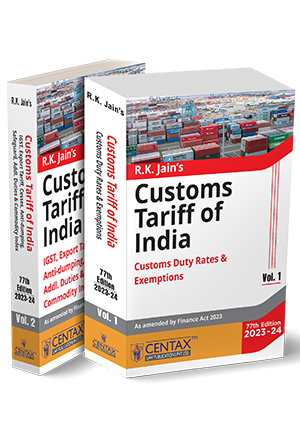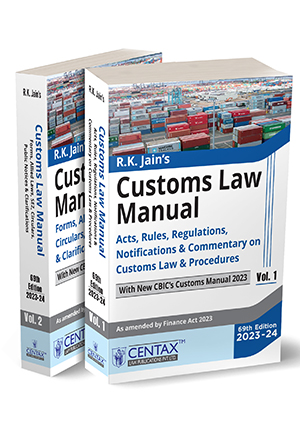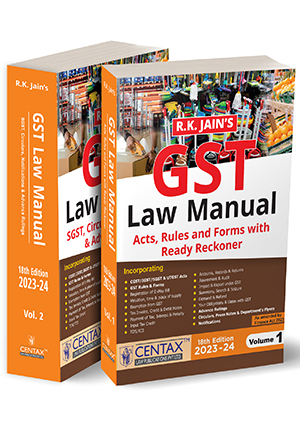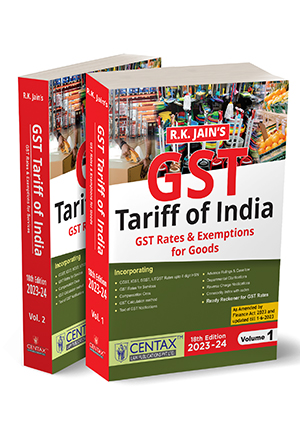Weekly Round-up on Tax and Corporate Laws | 6th to 11th May 2024
- Blog|Weekly Round-up|
- 9 Min Read
- By Taxmann
- |
- Last Updated on 14 May, 2024
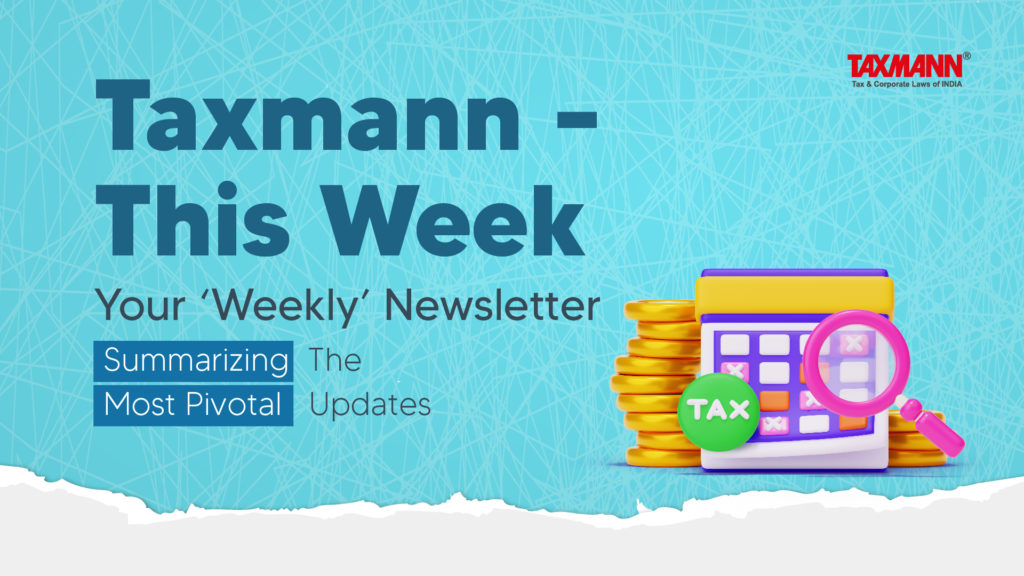
This weekly newsletter analytically summarises the key stories reported at taxmann.com during the previous week from May 6th to 11th, 2024, namely:
- SEBI proposes measures to reduce compliance burden and facilitate ease of doing business for InvITs and REITs
- Question of correctness of claim of deduction under section 80JJAA can’t represent escapement of income: HC
- GST Authority can’t pass order for insertion of negative balance in credit ledger of assessee: Telangana HC;
- ITC is allowed on GST paid on inward supply of cars which are used for demonstration purpose: AAR; and
- Asset Recognition and presentation in the context of Land Acquisition Disputes.
1. SEBI proposes measures to reduce compliance burden and facilitate ease of doing business for InvITs and REITs
The SEBI has released a consultation paper on Real Estate Investment Trusts (REITs) and Infrastructure Investment Trusts (InvITs). The consultation paper seeks public comments/views/suggestions on certain measures to reduce compliance burden and improve ease of doing business (EoDB) for REITs and InvITs. The consultation paper is divided into two parts. Part A addresses proposals for REITs and InvITs, while Part B focuses on InvITs.
The key proposals of the Consultation Paper are discussed hereunder:
(a) Timeline for fund distribution to unitholders to be reduced to 5 working days from the date of declaration
The existing REIT and InvIT regulations mandate that funds be distributed to unitholders no later than 15 days from the date of their declaration. However, it has been observed that most REITs and InvITs distribute funds to unitholders quarterly, which is not the case with listed companies. Accordingly, SEBI has proposed to reduce timelines for undertaking distributions by REITs/InvITs to 5 working days from the declaration date. These changes aim to expedite fund distribution, ensuring investors have quicker access to funds.
(b) Scheduling of Unitholders Meetings on a shorter notice
The existing REIT and InvIT Regulations mandate a notice period of at least 21 days for any matter requiring unitholders’ approval. SEBI has proposed an amendment to allow REITs (other than SM REITs) and InvITs to convene a unitholders’ meeting with less than 21 days’ notice, provided that consent is obtained from at least 95% of unitholders entitled to vote. These changes aim to facilitate timely decision-making, enhance operational efficiency, and safeguard unitholders’ interests.
(c) Review of Investor Complaint Statements quarterly
As per the SEBI Master Circular for REITs and InvITs, investor complaints statements must be submitted to the stock exchanges within 21 days of each quarter’s end. Further, a prior review of this statement by the Trustee and the BODs of the Manager/Investment Manager is mandatory before its submission to the stock exchanges. SEBI has proposed quarterly placement of this statement for review before the BODs of the manager/investment manager, eliminating the need for prior review. These changes aim to streamline the review process of investor complaint statements.
(d) Disclosure of Statement of Deviations alongside financial results
As per the SEBI Master Circular for REITs and InvITs, statements of deviations or variations must be submitted to the stock exchanges within 21 days of each quarter’s end. However, this provision does not align with SEBI (LODR) norms, which require a listed entity to submit a statement of deviation or variation to the stock exchange quarterly along with the submission of financial results.
SEBI has proposed submitting statements of deviation or variation concurrently with the publication of quarterly results. These changes aim to align the submission of deviation statements with quarterly financial results, benefitting investors and stakeholders.
(e) Clarification on voting thresholds and providing an e-voting option to unitholders
The current REIT and InvIT regulations require approval from unitholders in certain specified matters. The threshold for approval of any resolution is that votes cast in favour shall be more than votes cast against, or votes cast in favour must constitute at least one and a half times the votes against the resolution.
SEBI has proposed revising the provisions to state that the voting count shall be in percentage terms (at least 60%) instead of proportionate terms (one and a half times). For resolutions requiring more than, the voting count shall exceed 50%. Further, SEBI aims to clarify that voting thresholds must be calculated based on the persons present and voting.
Also, SEBI has proposed to provide an option for unitholders to attend the meeting via video conferencing or other audio-visual means. The option of remote e-voting must be provided to the unitholders for all meetings.
(f) Reduction in Trading Lot Size for Privately Placed InvITs
Currently, as per Regulation 16(8)(b) of the SEBI (Infrastructure Investment Trusts) Regulations, the trading lot for secondary market trading of privately placed InvITs is set at Rs 1 crore. If the InvIT invests at least 80% of its asset value in completed and revenue-generating assets, this trading lot increases to Rs 2 crores.
SEBI has proposed reducing the trading lot size for trading units of privately placed InvITs on designated stock exchanges from Rs 1 crore/2 crores to Rs 25 lakhs. This reduction is expected to increase market liquidity and broaden investor participation.
Read the Consultation Paper
2. Question of correctness of claim of deduction under section 80JJAA can’t represent escapement of income: HC
Assessee was engaged in information technology consulting, software development and business process services. For the relevant assessment year, a return of income was filed, claiming deduction under section 80JJAA of the Act. Such deduction was claimed after furnishing relevant forms and audit reports.
During the assessment proceedings, the assessment order was passed under Section 143(3), accepting the return of income filed by the petitioner. Subsequently, the Assessing Officer (AO) issued a notice under section 148 contending that the deduction under section 80JJAA was not available to the assessee as it was not deriving any profit from the manufacturing of goods in the factory.
Considering the deduction claim under section 80JJAA as information suggesting that income escaped assessment, AO passed the order under section 148A(d) and notice under section 148 of the Act.
Aggrieved by such notice, assessee filed writ petition before the Bombay High Court.
The High Court held that the issue raised in the impugned initial notice and the impugned order pertain to the correct claim of deduction/allowances or the expenditure incurred. There was also no allegation regarding income escaping tax on account of any undisclosed asset. The claim of deduction under Section 80JJAA or an issue of the correctness of the claim of deduction under Chapter VI of the Act cannot be covered by Section 149(1)(b).
Section 149(1)(b) prescribes that escaped income must be represented in the form of (i) an asset, (ii) expenditure in respect of a transaction or in relation to an event, or (iii) an entry in the books of account.
The question of the correctness of the claim of deduction under Section 80JJAA cannot represent the escapement of income in the form of an asset. The term’ asset’ is defined in Explanation to Section 149 to include the immovable property being land or building or both, shares and securities, loans and advances, and deposits in bank account.
The alleged claim of disallowance of deduction also can never fall under the specified category as it was neither a case of expenditure in relation to an event nor a case of an entry in the books of account, as no entries were passed in the books of account for claiming a deduction.
Furthermore, it was clarified there cannot be a reopening based on a change of opinion. The assessee claimed a deduction under Section 80JJAA in the return of income along with the tax audit report. AO also passed the assessment order allowing the claim of deduction under Section 80JJAA. Such claim was allowed by AO in the earlier years. Thus, the present reopening was clearly a case of change of opinion; hence, the reassessment was invalid and bad in law.
Read the Ruling
3. GST Authority can’t pass order for insertion of negative balance in credit ledger of assessee: Telangana HC
The High Court of Telangana has recently held that Rule 86A does not provide for insertion of negative balance in ledger, and under no circumstances could there be an order for insertion of negative balance in the ledger by the GST Authority. This ruling is given by the Honorable Telangana High Court in case of Laxmi Fine Chem v. Assistant Commissioner.
Facts
The petitioner had filed instant writ petition against the action on part of the department in blocking input tax credit (ITC) to the tune of Rs. 50.06 lakhs for the period from 01.02.2024 to 13.02.2024. It was contended that the ITC had been blocked in contravention of Rule 86A, where blocking can only be done so far as the ITC is available in the petitioner’s electronic credit ledger and could not have been done by way of giving negative credit.
High Court
The Honorable High Court noted that as per Rule 86A, only blocking the availing of ITC to whatever is in credit of the petitioner is permissible. No power is conferred upon authorities for the block of ITC to be availed by the petitioner in future. In the instant case, the department had made a negative credit entry in the petitioner’s electronic credit ledger, which is not permissible.
Therefore, the Court held that the action of authority in blocking ITC by making negative credit in the electronic credit ledger was contravention of Rule 86A and directed to immediately recall the order of blockage.
Read the Ruling
4. ITC is allowed on GST paid on inward supply of cars which are used for demonstration purpose: AAR
The West Bengal Authority for Advance Ruling Authority (WBAAR) has recently held that ITC is allowed on the purchase of demo vehicles where such vehicles are sold with a condition to further sell them to the customers after a specified period of trial runs. This ruling is given by WBAAR in the case of Landmark Cars East (P.) Ltd. v. Union of India.
Facts
The applicant is an authorized agent of Mercedes Benz India and is responsible for facilitating the sales of Mercedes-Benz passenger vehicles, including electric cars. It entered into an agreement with Mercedes Benz India where applicant would purchase demo vehicles from Mercedes-Benz India to provide facilitation services to Mercedes-Benz India. It filed an application for advance ruling to determine whether it would be eligible to claim input tax credit on purchase of demo vehicles.
High Court
The Authority for Advance Ruling observed that the applicant would maintain stock of demo vehicles for a specified period to provide trial runs and demonstrations to prospective customers and supply the same. The restriction of the input tax credit as imposed in Section 17(5)(a)(A) of the GST Act is not applicable to the purchase of demo vehicles.
However, the provisions of the GST Act nowhere specify that input tax credit shall not be available in respect of any outward supplies which is made at a price lower than its procurement value. Therefore, it was held that the applicant would be eligible to claim input tax credit on the purchase of demo vehicles.
Read the Ruling
5. Asset Recognition and presentation in the context of Land Acquisition Disputes
The Conceptual Framework for Financial Reporting under Indian Accounting Standards (Ind AS) defines an asset as a present economic resource controlled by the entity due to past events. An economic resource is a right that has the potential to generate economic benefits. These definitions emphasize three key aspects i.e. the presence of a right, the potential to generate economic benefits, and control over the resource. Consequently, recognition of an asset is contingent upon satisfying these criteria.
However, ambiguity may arise when considering assets for which full consideration has been paid per the agreement, yet possession couldn’t be obtained due to additional disputed demands. In such cases, it becomes crucial to determine whether to recognize the asset as Property, Plant, and Equipment (PPE), classify it as an advance, or apply another appropriate treatment under Ind AS. Also, clarifications are required to know how to present such assets in the financial statements.
In a similar case, where a construction company paid the full consideration as per the allotment letter but couldn’t obtain possession of the land due to disputed infrastructure charges, the company sought cancellation and a refund with interest. An Expert Advisory Committee (EAC) guided whether to classify it as ‘Land Inventory,’ transfer it to ‘Advance,’ or apply another suitable treatment under the applicable Ind AS.
EAC opined that since the company lacks possession of the plot and the pending sale deed, it does not possess the necessary rights or potential economic benefits from the land. Furthermore, the lack of control over the land’s use or benefits reinforces the conclusion that land does not meet the definition of an asset according to the conceptual framework.
However, the advance paid to the authority provides the company with the right to receive the land upon completion of formalities, thus having the potential to generate economic benefits. Therefore, the ‘advance paid for land’ meets the definition of an asset and should be recognized as such in the company’s financial statements.
Regarding presentation in the company’s books, EAC suggested treating the advance paid for land as a non-financial asset since it represents future economic benefits in the form of receiving land rather than a right to receive cash.
Read the Story
Disclaimer: The content/information published on the website is only for general information of the user and shall not be construed as legal advice. While the Taxmann has exercised reasonable efforts to ensure the veracity of information/content published, Taxmann shall be under no liability in any manner whatsoever for incorrect information, if any.

Taxmann Publications has a dedicated in-house Research & Editorial Team. This team consists of a team of Chartered Accountants, Company Secretaries, and Lawyers. This team works under the guidance and supervision of editor-in-chief Mr Rakesh Bhargava.
The Research and Editorial Team is responsible for developing reliable and accurate content for the readers. The team follows the six-sigma approach to achieve the benchmark of zero error in its publications and research platforms. The team ensures that the following publication guidelines are thoroughly followed while developing the content:
- The statutory material is obtained only from the authorized and reliable sources
- All the latest developments in the judicial and legislative fields are covered
- Prepare the analytical write-ups on current, controversial, and important issues to help the readers to understand the concept and its implications
- Every content published by Taxmann is complete, accurate and lucid
- All evidence-based statements are supported with proper reference to Section, Circular No., Notification No. or citations
- The golden rules of grammar, style and consistency are thoroughly followed
- Font and size that’s easy to read and remain consistent across all imprint and digital publications are applied






